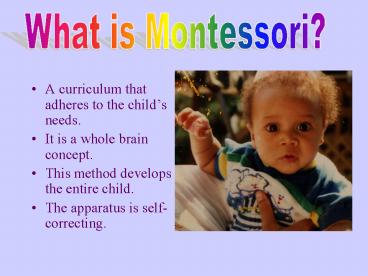A curriculum that adheres to the childs needs' PowerPoint PPT Presentation
1 / 10
Title: A curriculum that adheres to the childs needs'
1
What is Montessori?
- A curriculum that adheres to the childs needs.
- It is a whole brain concept.
- This method develops the entire child.
- The apparatus is self-correcting.
2
MEANING OF MONTESSORI
- Montessori is a philosophy with the primary tenet
or principle - that children learn best within a social
environment which - supports each individuals own unique
development. - Children are to be respected differently from
adults - They are individuals who are different from each
other - Children create themselves through purposeful
activity - The most important years of learning are from
birth to age six - Children posses unusual sensitivity and mental
powers for - absorbing and learning from their environment,
which includes people as well a materials.
3
Activities
- Practical Life
- Sensorial
- Language
- Mathematics
- Geography
- Culture
4
Procedures
- The environment is well prepared
- All apparatus arranged on childs level
- All lessons are individualize
- Children are taught the core lessons first
- Each individual can then choose other work
- All completed work in an accomplishment
- Progress is recognized through observation
5
Acquired Skills
- Self Discipline Through meaningful work
- Independence in making choices
- Socialization by peer interactions
- Order through repetition and consistency
- Cooperation by sharing and being respectful
- Coordination in physical development
- Creativity through being able to explore
- Self Motivation by feel a sense of freedom
6
Practical Life
The activities given in Practical Life teaches
the children care of themselves, care of the
environment, caring for others as well as grace
and courtesy and movement. The materials are
child sized Practical Life exercises are the
foundation of the Montessori program. With a
wholesome range of materials, all lessons
are easily made age appropriate.. Children
develop self confidence, self control, self
discipline, which result in a high
self-esteem. Students also develop a sense of
order, independent work habits, and endless other
human characteristics though meaningful work .
7
SENSORIAL
These materials are simplistic in appearance, yet
extremely rich in skill building. Children
learn gradation and sorting of shapes, sizes,
colors, touch, sound, temperature,and
weight. Most of the Montessori have a built-in
control of error factor. Students work
independently, in pairs, or as a group.
Repetition is the key in assisting small children
in skill development. The Sensorial materials
set the foundation for concrete Math, Language,
Geometry, Science, Art, Music, and Geography
skills. Children are allowed to explore
independently, unafraid of mak- ing mistakes,
with the realization and understanding that
errors are essential in the process of learning.
All of the subject matter is hands on and
sensorial based. Of all of the Montessoru
materials Sensorial are the childrens favorite.
8
LANGUAGE
Sandpaper Letters assist children in the learning
of the alphabet The letters are taught out of
sequential order phonically. The lessons include
the shape, the feel, the sound and the name
of each letter. Ninety percent of reading is
taught through sounds. Using the Moveable
alphabet encourages children to start mak- ing
two and three letter words paving the way to
solid reading skills. Metal Inset material
prepares the child to control a writing
instrument. The goal of these materials is to
not just to teach reading and writing, but to
enhance and facilitate the process of creativity
by providing a rich abundance of precise
language materials..
9
MATHEMATICS
All of the other Montessori learning tools assist
in the preparation of Mathematics. Well before
the children begin working with any math
apparatus, they learn logic, sequencing, quantity
per object, and the development of eye, hand,
and mind, all of the necessary tools for learning
solid Mathematics skills. The math
materials isolate various concepts then integrate
them to form the strongest possible foundation
for the childs mathematical knowledge.
An example of how is works is when the children a
sensorial experience of the abstraction that is
mathematics, allowing them to store concepts so
that when the time comes to deal exclusively in
abstract terms, the understanding is already
there.
10
SCIENCE AND CULTURE
Science for young children is very mystical to
them. They get to do a variety of simple
experiments that are prepared especially for
them. The materials are all age appropriate and
stimulates the childs curiosity to learn more
about nature and the world around them. The
children sing songs about each organ, followed-up
with anatomy puzzles work, and an apron that has
pictures of all of the organs with removable
velcro matching organs. This is a typical
simple, but very effective method of teaching
science to small children. It is not important
that they remember any of this material, rather
that they have exposure and access to scientific
knowledge at a very early age. You will be
amazed at how much is retained just by exposing
the children to early science apparatus.
Everything is hands-on.

